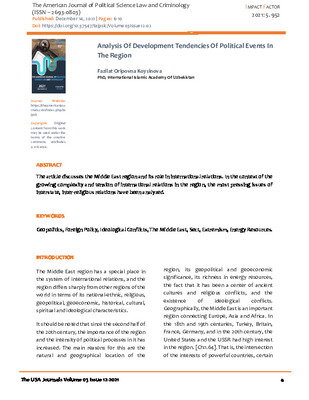Analysis Of Development Tendencies Of Political Events In The Region
Abstract
The article discusses the Middle East region and its role in international relations. In the context of the growing complexity and tension of international relations in the region, the most pressing issues of interstate, inter-religious relations have been analyzed.

Downloads
PhD

Keywords:
Abstract
The article discusses the Middle East region and its role in international relations. In the context of the growing complexity and tension of international relations in the region, the most pressing issues of interstate, inter-religious relations have been analyzed.
References
Qo'ysinova, F. (2020). Stages of development of the organization of islamic cooperation (1969-1990). The Light of Islam, 2020(4), 63-71.
Gafurov S.M. (1997). Arab countries of Persidskogo zaliva vo vneshney politike Velikobritanii (Vtoraya mirovaya voyna - 1990 gg.). abstract dis. ... kan. polit. Science. T.-S 7. (22 b)
Panin V.N. (2004). Politicheskiy protsess na Blijnem Vostoke: vliyanie Rossiyskoy Federatsii i SShA. Diss ... dokt.polit.nauk. Pyatigorsk.
Terexov R.S. (2011). Influence of ideological pan-Turkism on the foreign policy of the Ottoman Empire and the Turkish Republic in the XX century. Diss .. kand.istor.nauk. Nizhny Novgorod.
Maxir Khalifa-Zade. (2011). Iran and borba for influence in the southern Caucasus. kond.poli.nauk. Central Asia and the Caucasus.T 14 / V-1. S-61
Suleymanov A.V. (2010). Saudi Arabia, Iran, Turkey and Pakistan: Problems of mutual relations in the framework of OIK. Vestnik Rossiyskogo universiteta drujby narodov. Q: International relations. V.№ 4/S. (29-35)
Bukin A.V. (2014). Posrednicheskaya politika Katara v arabskix stranakh. Vestnik RUDN, seriya Mejdunarodnye otnosheniya, № 3. S.98
Oripovna, Q. F. (2020). The Organization Of Islamic Cooperation And Arab World: Prosesses Of Events. The American Journal of Political Science Law and Criminology, 2 (11), 33-40. https://doi.org/10.37547/tajpslc/Volume02Issue11-06
Kuysinova Fazilat Oripovna (2019). The role and political imidge of the organization of the Islamic Conference in the international relationship system. Bulletin Socio-Economic and Humanitarian Research, (2 (4)), 61-68. https://doi.org/10.5281 / zenodo.2647705
Muhammadsidiqov, M. (2018). The influence of “religious factor” on ethno-political and confessional conflicts in muslim countries. The light of islam, 2018(1), 18.
Mukhammadsidiqov, M., & Turaev, A. (2020). Influence of us neoconservatism on formation of national security paradigm. The Light of Islam, 2020(3), 113-120.
Muhammadsidikov, M. (2015). Özbekistan’da toplumsal yaşamin ana özelliği hoşgörü/Tolerance is the Main Feature of Uzbekistans Social Life. Atatürk Üniversitesi Sosyal Bilimler Dergisi; Sayı 54 (2015): Atatürk Üniversitesi Sosyal Bilimler Dergisi.
Sobirov, S. (2020). Participation of Uzbekistan in The Cooperation Council of Turkic Speaking States. InterConf.
Sobirov, J. (2020). International Relations Between Turkic Speaking States. The American Journal of Political Science Law and Criminology, 2(12), 144-149.





